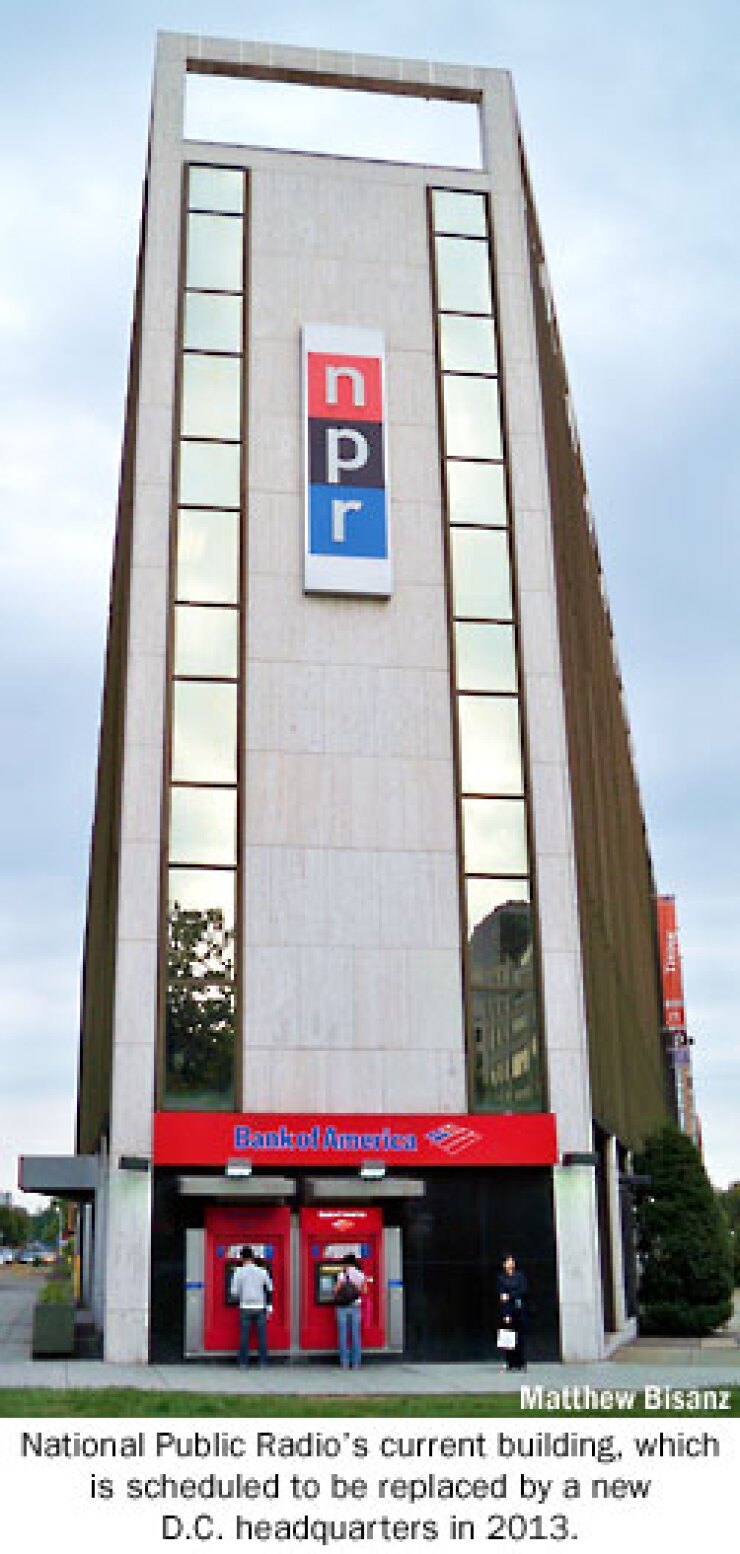
WASHINGTON — The District of Columbia tomorrow will issue $160 million of revenue bonds for the country’s largest non-commercial radio broadcaster, National Public Radio Inc., which has bolstered its listener base over the last 10 years, showing a steady increase in audience in contrast to other mainstream media companies.
The transaction will be NPR’s first issuance of rated debt and will help finance its new headquarters here.
Several local public-radio stations that broadcast NPR programs have issued debt and have tax-exempt bonds outstanding, but they are separate companies and buy programs from NPR. These stations have experienced strong listener growth over the decade as newspaper and broadcast news audiences declined.
The tax-exempt, fixed-rate bonds will be issued in two series: The Series A bonds will have a 10-year call option and the Series B bonds will have a five-year call option. Specific dollar amounts for the each series will be determined at pricing, with the longest-term bonds maturing in 2043, sources said.
The bonds are rated AA-minus by Standard & Poor’s and Aa3 by Moody’s Investors Service.
Morgan Stanley will be lead underwriter with Loop Capital Markets LLC and JPMorgan serving as co-underwriters.
Squire, Sanders & Dempsey LLP is bond counsel. The underwriters are represented by McGuireWoods LLP. Davenport & Co. is the financial adviser.
Bondholders are secured by a first-mortgage lien on NPR’s new headquarters. In the case of a default, they will be able to move to foreclose on the property, said Davenport’s James Traudt.
The company is expected pay off its outstanding bank loans by the time the bonds are issued and will only have this deal outstanding, sources said. NPR has no additional debt plans after this deal.
Groundbreaking for the new headquarters, which will be located at 1111 North Capitol Street NE, is expected in fall of 2010. The building is scheduled to be completed and occupied in June 2013.
NPR’s listenership has expanded 63% from 1998 to 2008, according to a study conducted by the Pew Research Center for the People and the Press that was published in 2008 and cited by Moody’s. The audience for commercial radio has increased 13%, the report said, as newspapers’ audiences dropped 29% and nightly network news audiences fell 19%.
“The growing audience is attractive for corporate sponsorship,” said Karen Kedem, Moody’s lead analyst on the credit. “That helps to secure that revenue stream over time.”
NPR programs are broadcast on about 783 stations and the their fees contributed 42% of the company’s revenue in fiscal 2009. Corporate sponsorship is the second-largest slice of NPR’s revenue, adding 23%.
Radio companies’ advertising dollars are directly tied to gross domestic product trends, according to James C. Goss, a senior investment analyst with Barrington Research Associates Inc. in Chicago who covers media companies, including Sirius XM Radio Inc.
Ad revenues are beginning to return from the “worst-case situation” amid the depths of the recession, he said.
Yet despite its growth, NPR’s listener base faces a threat from more and more media alternatives that compete for ears, Goss said.
NPR has “an increasingly competitive landscape for listenership” with other radio stations, he said, as well as with Pandora Media Inc., the free, Internet-based music station, and Apple Inc.’s iPod.
“In addition to having some of the audience shipped away, [NPR] has some of its advertising siphoned off on to other competing alternatives,” Goss said.
NPR also is expanding beyond its classic radio platform. The NPR News iPhone application drew 15.5 million page views in September, or about one-third of its main Web site page for that month, according to the company. Its programs can be heard on two Sirius XM Satellite Radio stations.
NPR has not received federal government funds for operating support since 1983. About 2% of its annual budget comes from competitive grants from federally funded organizations like the Corporation for Public Broadcasting and the National Endowment for the Arts.





